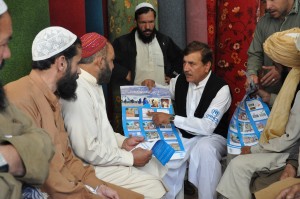BAGH, 30 June, Azad Jammu and Kashmir (AJK): From Mirpur, in Pakistan Administered Kashmir, a UNHCR team bumped for eight hours along the road that winds through the mountains to reach Bagh – a faraway, lush, forested valley.
The journey was tiring yet exciting as high peaks thrust into the sky in a picture of natural beauty. People mostly reside in houses that sit on the mountain slopes. When night falls, the twinkling lights make it seem as though the earth has become like the sky.

UNHCR teams travel to Pakistan’s remote valleys for information dissemination to Afghan refugees on issues that matter. (c) UNHCR/Q.K.Afridi
Abdur Rehman, a 48-year-old Afghan refugee, is one among those living on these mountain slopes. For him, there is good news. His family is going to receive renewed Proof of Registration (PoR) cards, an important protection and identity document issued to registered refugees by the Government of the Islamic Republic of Pakistan. The existing PoR cards held by Afghan refugees expired in December 2012. In July 2013, the Government announced the extension of the Tripartite Commission Agreement governing the voluntary return of Afghans, and the extension of the validity of the PoR cards until the end of 2015.
“This is great news. Now I can move freely without hurdles,” Rehman expressed his happiness after the Shura(council) meeting arranged by the visiting UNHCR team for Afghans in Kashmir.
Reaching out to people in need during humanitarian emergencies or getting a message out to the far-flung and inaccessible areas often poses a major challenge to aid agencies. However, for the humanitarian agencies, no matter how big the challenge, there is always a way.
The visit to Rehman’s village took the UNHCR team more than eight hours on a bumpy road. The team is well-known and respected by the refugees. They were received warmly and served with traditional green tea.
The community elders had arranged a gathering, inviting all of the prominent members of the Afghan refugee community, at a market in Bagh valley, where the UNHCR team briefed Afghans about the PoR card renewal procedures. Rehman is among them, sitting quietly but attentively as he listens to the briefing. The PoR card renewal is not only good news for Rehman, but for all those Afghans who sporadically face harassment while traveling.
Belonging to Gardez in Afghanistan, Abdur Rehman was a 14-year-old when he fled Afghanistan along with his mother after the outbreak of war. “Initially, we thought we would just go to Pakistan for one month, but look at us – we are still here due to the many problems back in Afghanistan,” he said, adding, “In Afghanistan, I have no land, no home, no job and no security.”
Rehman hopes that peace will be restored in his country so that he can go back. He still misses Afghanistan. Until that happens, his family, like many others, needs the protection afforded by the Government of Pakistan and UNHCR.
“We always struggle to reach every Afghan, so that everyone receives timely information about anything affecting their stay in Pakistan. Mostly the information is about the voluntary repatriation procedures, or the provision of legal assistance. At present it is more focused on the renewal of the PoR cards,” said, Shahid Majeed, one of the UNHCR field staff who has been conducting such Shura meetings for many years.
Shura meetings are one of UNHCR’s mass information tools to inform refugee communities about new developments relating to their stay in Pakistan. Across the country, UNHCR teams travel through different areas, gather refugees under one roof, and apprise them of new developments.
This time, the focus of UNHCR field teams was on spreading information about the PoR card renewal process that started in February this year. Pakistan’s National Database and Registration Authority (NADRA), in collaboration with the UN Refugee Agency, started issuing renewed PoR cards to more than 1.6 million registered Afghan refugees in Pakistan. To date, more than 1 million of the registered Afghans have already received their new cards.
By Qaiser Khan Afridi,in Bagh, Pakistan Administered Kashmir
Share on Facebook Share on Twitter